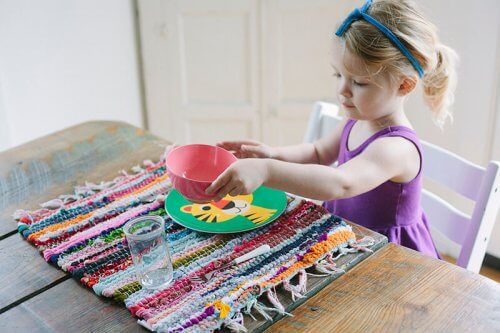Appropriate Chores for Children, According to Their Age

Would you like to promote the values of independence, self-esteem and responsibility in your children? An excellent way to do that is by designating chores for children according to their age.
Although most parents are prepared to do everything for their children, the truth is that involving children in household chores is actually beneficial for their well-being.
That’s why we’ve decided to share with you a list of chores for children that are appropriate for their age.
While some people see chores as an unnecessary way of overloading responsibilities on young children, others think just the opposite. Those in favor of chores point out the following advantages:
- Children learn how to do different chores at home.
- They acquire a sense of responsibility and autonomy, which is useful in the future.
- They learn to value household chores as they understand the effort we put into them.
- Doing chores promotes self-esteem and confidence.
For these reasons and many more, it’s a good idea to establish a routine that allows children to participate in doing chores around the house.
Here are some tips to help them get involved:
Chores for children according to age
You can assign different tasks at home depending on your child’s age. Here are some examples:
Children from the age of 2 to 3
During this phase, the chores that are assigned to children should be simple and have to do with organization. For example, they could organize their toys, throw objects in the trash, pick up their dirty clothes and water plants.
Children from the age of 3 to 5
In addition to the chores mentioned above, at this age we can add some more chores that aim to increase children’s independence.

Children can start dressing on their own for example. We can also teach them how to shower on their own and even how to wash dishes. Children usually do these easily because they see them as a personal challenge. All of these chores should be done under your close supervision.
Children from the age of 6 to 7
Around this age, children are more aware of harmful elements such as knives and glass. If you think they’re ready, you can ask them to help you set the table.
At this age your children will also be able to make their bed on their own as well as prepare their backpack and clean up their room. You can also ask them to help you clean furniture in the areas where they play.
“When doing homework, children acquire a sense of responsibility and autonomy that is useful for the future”
Children from the age of 8 to 10
At this age, children can bathe on their own. They can also take care of their pets or clean the floors.
If your children are interested in the kitchen, you can also help them learn a few things. Supervise them closely when they’re in the kitchen. Let them prepare their own snacks or breakfast. Make sure they don’t use dangerous elements such as stoves and knives.
Children between the age of 10 and 11
At this age your children will be more mature and they’ll understand how to perform more complicated chores at home. For example, they’ll be able to use cleaning items, so it’s a good time to involve them in cleaning their room. You can also ask them to take the pet for a walk or take care of their younger siblings at home.
Children over 12 years old
This is one of the final stages of childhood. At this stage your child will be able to take on many different tasks at home. They’ll be able to hang clothes, cook simple dishes and do some shopping on their own.
This is also an ideal stage to teach them to embrace their independence. They’ll develop different tools at this stage that will help them for the rest of their lives. These tools will also be vital when they go to college.

Tips to put into practice:
Before assigning the chores for children mentioned above, consider the following suggestions:
- Don’t give orders. The aim of this exercise is to internalize these habits, not to create daily struggles.
- Help them when necessary.
- Offer rewards and recognize their effort.
- Don’t criticize the results of their work. This can cause them to get frustrated and give up the chore.
- Be patient and teach them the proper way to carry out their chores.
In conclusion, doing certain chores at home is a beneficial activity for both children and parents. Doing chores will also help reinforce your role as a guide and teacher.
All cited sources were thoroughly reviewed by our team to ensure their quality, reliability, currency, and validity. The bibliography of this article was considered reliable and of academic or scientific accuracy.
- Goodnow, J. (1996). Contribuciones a la familia: las ideas de padres e hijos sobre las tareas domésticas. Infancia y Aprendizaje, 19(73), 19-33. https://www.tandfonline.com/doi/abs/10.1174/02103709660560528
- Mendoza, R., Batista-Foguet, J. M., & Rubio, A. (2006). La cooperación de los adolescentes en las tareas domésticas: diferencias de género y características asociadas. Cultura y Educación, 18(3-4), 363-379. https://www.tandfonline.com/doi/abs/10.1174/113564006779172966
- Landwerlin, G. M. (1997). El papel de los niños en la redefinición del trabajo doméstico en la nueva familia urbana española. Revista Internacional de Sociología, 39-56. https://search.proquest.com/openview/032da01b9737a0dabe85cab5742cef2b/1?pq-origsite=gscholar&cbl=1817790
This text is provided for informational purposes only and does not replace consultation with a professional. If in doubt, consult your specialist.
